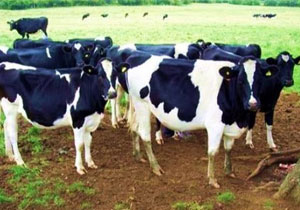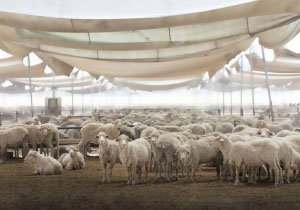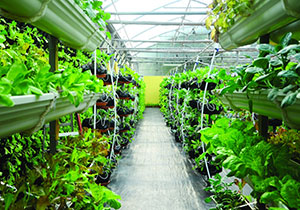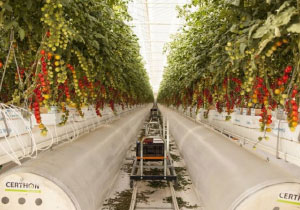Greenhouse coverage
The most important feature of the greenhouse coverage is to ferry the maximum amount of heat and sunlight and deliver it to the plant.
None of the coverage has 100 percent of light and heat transformation; because some of the light is reflected or absorbed into the cover. Among different covers in terms of light passing, glass is in the first rank, and the plastic cover is in the second place.
Different types of the greenhouse cover
Glass cover
The quality of the glass and its dimension is effective in light passing. The more percentage of iron more canescent is the glass and ferry a lower amount of light. The larger pieces of glass are better than the small ones in terms of light crossing. The greenhouse with a glass cover is the most expensive type of greenhouse, and its building and conservation are higher than the plastic cover.
Plastic cover
To cover greenhouses, thin plastic plates are used such as polyethylene, polyester, vinyl polychloride (P.V.C), Polyvinylidene difluoride (P.V.F).
Polyethylene is the most useful one in the greenhouse cover. Almost all of the recent greenhouses are of two layers. Used polyethylene to cover greenhouse, including Anti (UV) ultraviolet radiation. One of the advantages of these covers is that it needs no heavy skeleton, and it decreases the warm-up costs by up to 40% compared to the one-layer glass greenhouses.
Plastic polyethylene cover(roof)
Polyethylene is a roof with various use for covering greenhouses, especially. In terms of chemicals, Polyethylene is neutral, it is glossy, slippery, and remains soft and elastic even in very cold weather. It should not be folded because its strength in folded place decreases, therefore it is cracked in the severe cold.
Characteristics of polyethylene coating
-Polyethylene covers have lower primary costs and can immediately cover the temporary or permanent greenhouses.
Thin polyethylene plates that have the best quality and the most tensile strength, only last for 3-4 years, and the ultraviolet of sun causes the plastic to become brittle and dark, and finally tears it apart.
-Polyethylene cover maintains the moisture in the greenhouse and during winter; because the polyethylene cover is colder than the inside weather, the warm and wet weather of the inside becomes cold while touching the cold surface of the polyethylene. As a result, the steam on the polyethylene's surface turns into liquid. Since this surface is water-repellent, the water drops slip downward and create bigger drops. Pouring these cold drops on plant leaves causes the spread of fungal diseases, and creates a shock.
-Polyethylene has a weak thermal conductivity and maintains the heat in the greenhouse. But to decrease the heat waste in the greenhouse environment, a two glazed covering system and compressed air between them. It decreases the fuel costs significantly (by up to 40%).
-On cold nights each warm thing flashes the infrared light energy to the surroundings. This condition causes wasting a lot of heat inside the greenhouse. Using polyethylene makes a weak shield against infrared light.
Plastic polyethylene cover(roof)
- Super User
- Plastic polyethylene cover(roof)
- Hits: 126









